
Authors: Tena Prelec and Jovana Marovic
Recent electoral outcomes have challenged the notion that elections in the Balkans are not able to bring about change. How has the public responded? It is argued that, in spite of the manifest obstacles for challengers to prevail over incumbents, public opinion is contingent upon the recent experiences in each country. Once shown the way, besides long period of stasis (or even state capture), citizens start believing that change is possible. The findings of the brief indicate that, in relation to electoral participation, the ‘collective action’ problem in the Balkans – characterised as lack of confidence in the possibility of change, leading to disillusionment with the democratic process and individual unwillingness to act to bring about change – might not be as difficult to break as previous research had indicated.
Recent electoral outcomes have challenged the notion that elections in the Balkans are not able to bring about change. How has the public responded? It is argued that, in spite of the manifest obstacles for challengers to prevail over incumbents, public opinion is contingent upon the recent experiences in each country. Once shown the way, besides long period of stasis (or even state capture), citizens start believing that change is possible. The findings of the brief indicate that, in relation to electoral participation, the ‘collective action’ problem in the Balkans – characterised as lack of confidence in the possibility of change, leading to disillusionment with the democratic process and individual unwillingness to act to bring about change – might not be as difficult to break as previous research had indicated.
